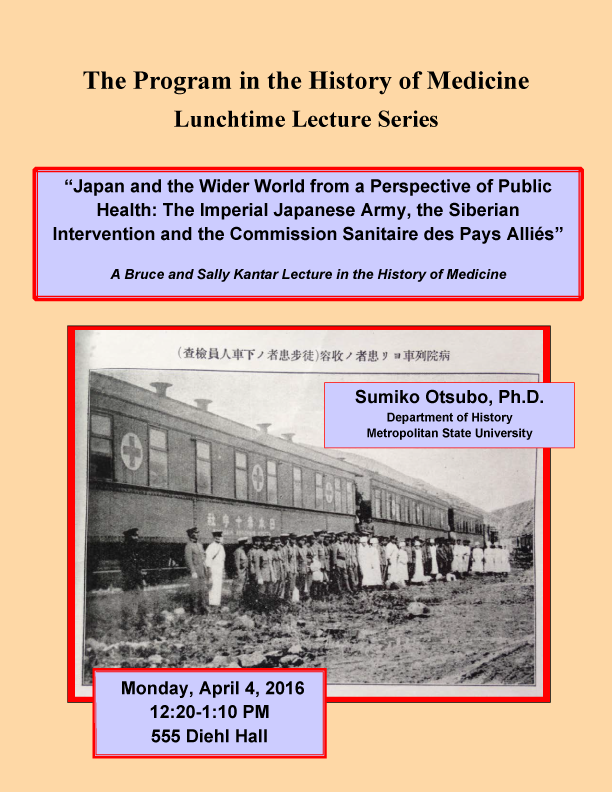INVITATION:
You are cordially invited to A Bruce and Sally Kantar Lecture in the History of Medicine, in the Program in the History of Medicine Lunchtime Lecture Series, on Monday, April 4, 12:20–1:10 PM in 555 Diehl Hall. Please feel free to distribute this information and post the attached flyer.
SPEAKER:
Sumiko Otsubo, Ph.D., Department of History, Metropolitan State University
“Japan and the Wider World from a Perspective of Public Health: The Imperial Japanese Army, the Siberian Intervention and the Commission Sanitaire des Pays Alliés”
Abstract:
For Japan, the Siberian Intervention (1918-1922), or the multinational military intervention in the Russian Civil War against the Red Army in Siberia, was a costly war which accomplished very little geopolitically. From an epidemiological perspective, however, it was significant. It established microbiological links by putting refugees, Allied troops, and military horses in contact with locals. This made them unknowing hosts to, and carriers of, such deadly infectious diseases as cholera, typhus, and influenza. In order to protect their own troops, Japanese army physicians began to work with like-minded colleagues of the co-belligerent nations. Thus, the Commission Sanitaire des Pays Alliés (Rengōkoku Eisei Kaigi) was created in August 1918. Though there have been studies on international collaboration in Siberia focusing on the Red Cross, the Imperial Japanese Army’s involvement in this joint public health work has been little researched. This study hypothesizes that this military medical cooperation in Siberia ushered in the era in which Japan became integrated into the existing International Office of Public Health (est. 1907), which would become the foundation of the International Health Organization in the League of Nations. In other words, the transnational nature of diseases during the Intervention and the multinational nature of the Intervention might have played a key role in preparing Japan for participation in the institutionalization of a permanent international health organization.
Campaign Materials
- Logo
- Booklet
- Brochure
- Folding Card
- Sticker and Temp Tattoo
- T-shirts
- Press Coverage and Success Story
- Social Media
- Bus Poster
- Door Hanger
- Monthly eNewsletter
- Bicultural Healthy Living Weblog
